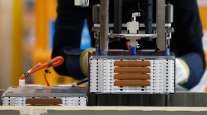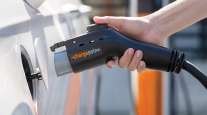CEO, Dragonfly Energy
Perspective: The US Needs Lithium Independence

[Stay on top of transportation news: Get TTNews in your inbox.]
The race for lithium, the lifeblood of modern batteries, is on. While lithium is present throughout our daily lives, the transportation industry specifically has seen a significant increase in demand for lithium batteries in recent years. Spurred by the adoption of electric vehicles, the use of lithium has extended to the trucking industry, which is experiencing high demand as companies see some of the benefits of battery-powered equipment, such as all-electric auxiliary power units, electric forklifts and power liftgates. Some fleets are even exploring the deployment of fully electric trucks.
As energy demands continue to fuel technological innovation, the urgency of securing a stable supply of this critical resource becomes more apparent. For the United States, the pursuit of lithium independence is not just an economic imperative but a strategic necessity. With China’s significant control over global battery production, the battery market could potentially become overly reliant on Chinese manufacturers and suppliers. As Bloomberg has reported, China’s battery makers supply about 80% of cells worldwide, supported by a mining and processing supply chain that is increasingly under the country’s control. As geopolitical uncertainties loom, the question arises: Can America truly break free from its dependence on foreign sources and forge its path toward lithium independence? While nascent in the trucking industry, the EV market is still a player in the lithium battery landscape. As we face this potentially transformative shift, we must confront our dependence on China for this vital resource.
While the United States has demonstrated a commendable desire to diversify its lithium supply chain through initiatives like the Inflation Reduction Act and President Joe Biden’s recent tariff increases on Chinese EVs and clean energy products, the road to true independence remains fraught with challenges.
Recent developments offer a mixed picture of progress and peril. On one hand, announcements of lithium mines in Nevada and plans for battery factories nationwide signal a promising movement toward self-sufficiency. However, mining companies face their own challenges regarding permitting and Environmental Protection Agency restrictions, which can significantly delay or even halt projects altogether. This creates tension with the administration’s push for domestic lithium production. Meanwhile, Tesla’s recent talks with Contemporary Amperex Technology Co., a major Chinese battery maker, exemplify America’s troubling reliance on Chinese technology. This raises legitimate concerns about the integrity of our supply chain.

Phares
Criticism abounds regarding the potential risks of embracing Chinese technology, from concerns over compromised national security to the erosion of economic autonomy. The demand for domestically produced lithium batteries is set to skyrocket as prices on Chinese batteries increase due to higher tariffs, and companies and government contractors look for products that fit the Buy American Act. That legislation sets requirements for procurement of domestic materials and products.
Trucking needs a stable, sustainable supply of domestic lithium to protect against supply chain disruptions that could affect availability of equipment or cause shipping delays and port closures. A domestic lithium supply would also help foster a solid economy by eliminating the fluctuation of global markets — enabling both producers and trucking companies to plan long-term investments better and manage operational costs effectively.
The makers of Transport Topics' updated Top 100 For-Hire Carriers list examine how the freight market slump has altered the competitive landscape in trucking. Tune in above or by going to RoadSigns.ttnews.com.
RELATED: Five Key Considerations for Fleet Electrification
The path to lithium independence holds the promise of reclaiming America’s leadership in innovation and industry. This endeavor, which the Biden administration is championing, could lead us to a greener, more resilient future. By endorsing homegrown remedies and supporting domestic players that offer lithium cell manufacturing technologies, we can reduce our reliance on foreign sources, stimulate our economy and enhance national security.
Achieving true lithium independence is a challenging task, but not insurmountable. While government incentives and policy changes have spurred progress, the responsibility now falls on industry stakeholders to align their interests with the broader national agenda. With concerted effort and unwavering commitment, we can overcome these challenges and pave the way to a future of lithium independence.
Denis Phares, Ph.D., has pioneered renewable energy storage innovation since founding Dragonfly Energy in 2012 and holds several key patents in cell manufacturing.
Want more news? Listen to today's daily briefing below or go here for more info:





